Earlier this week one of our Golden Laced Wyandotte pullets laid this…
Poor Pullet.
At first glance it resembled a goose egg more than a pullet egg!
It’s officially a record for this year’s pullets, weighing in at a hefty 86 grams! Anything over 71 grams is a ‘Jumbo’ by USDA sizing standards, and even our old hens don’t lay eggs this big!
As we mentioned in our Double Yolks post, over-sized eggs in our nest boxes almost always contain multiple yolks.
I’d never boiled a multi-yolker from our chickens before. In fact, I don’t tend to make boiled eggs much any more, primarily because our eggs are so fresh, they’re darned near impossible to peel! As the shell is removed from a boiled super-fresh egg it invariably results in large chunks of egg white being pulled away. They’re edible, but it makes them rather ugly.
One way around this is to intentionally set aside some eggs to ‘age’ in the refrigerator for a few days…but I always forget to do that in advance of when I want them.
However, I recently read a post from June at Four Green Acres, and she had a tip to try placing baking soda in the water when boiling very fresh eggs. We followed June’s instructions, boiling the egg in baking soda and water. We then plunged the egg into an ice bath until well chilled.
Still skeptical, we then peeled away the shell.
As you can see, the egg came out very near perfect. I’ve tried other tricks in the past for peeling fresh eggs, including using the ice bath before, and always had less than desirable results. I can honestly say though that the baking soda trick really seemed to help!
My sciency brain though wanted to know why it worked, so I pulled my copy of Harold McGee’s book “On Food and Cooking: The Science and Lore of the Kitchen“ off the shelf. McGee concurs that very fresh eggs are characteristically difficult to peel. He explains that the albumen of a very fresh egg is more acidic (has a lower pH) than an old egg. This causes the proteins in the albumen to stick to the shell membranes more strongly than the albumen proteins adhere to each other, which is why they’re impossible to peel. Egg whites become more basic as they age though, which causes them to become less sticky, so the proteins within the albumen cohere to each other, rather than to the shell membrane, and thus makes the egg easier to peel. For boiling very fresh eggs, he recommends adding 1/2 teaspoon of baking soda per quart of water to raise the pH, making the water, and the eggs cooked in it, more basic, mimicking an aged egg.
Now we know this trick really does work, unlike some others we’ve tried, we might just have to try boiling a few more eggs for breakfast.
Oh, and yes, this week’s giant egg was indeed a double yolker, and was very tasty too!

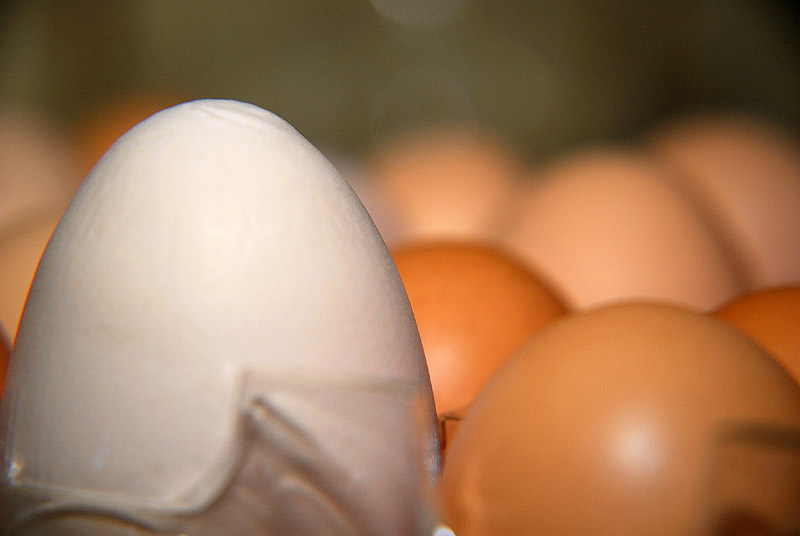
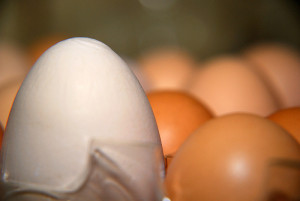
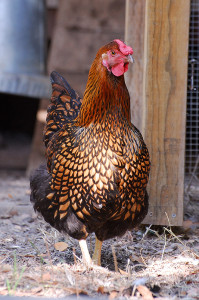
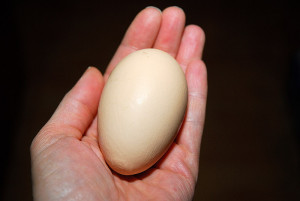
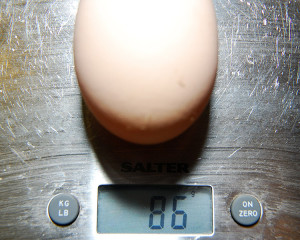
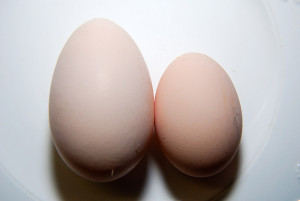
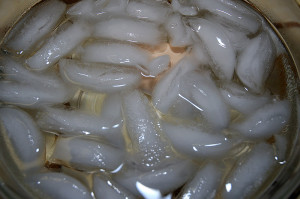
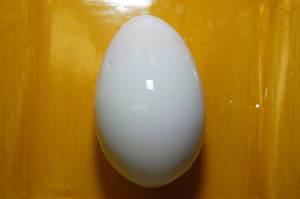
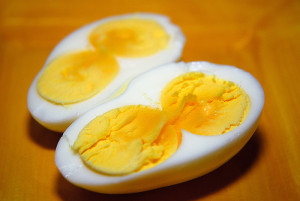
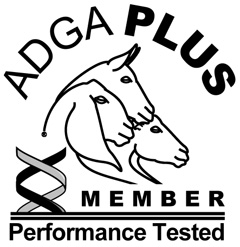






I’ll have to try the baking soda trick. The eggs I get from you are fresh — but not “that day” fresh — and usually peeling them in cold water is sufficient, though still not what I call “easy.”
Good lord, what an accomplishment for such a young chicken! As always, an interesting and informative post.
Oh My GOODNESS! Okay, 1st: WOW that’s a huge egg. Exciting, and I hope the hen is healing speedily. =) 2nd: I SO don’t boil eggs for the same reason tho I’d love to, 3rd: I cannot believe you found and posted the answer, and 4th: YOU EXPLAINED WHY. I, too, am a science-dork so knowing the answer makes me SO happy. THANK YOU 1,000 times. =)
Thanks for sharing the tip! I just received my copy of On Food and Cooking yesterday. How fun to see your reference to it today.
It’s really exciting to see a 86gram double yolk egg. Hope you get them more often.
Oh my, I hope we don’t! 😉 The poor girls really aren’t used to laying such large eggs. As an occasional event it’s fun, but I always worry that one of the girls will get egg-bound trying to pass an egg as large as this.
Mmm, that looks yummy. Reminds me of the time when I had a friend with chicken. Those eggs were so much better than anything from the store…
That is one huge egg. From a youngster none the less. If a chicken lays an egg that size, does it miss the next egg laying day? I imagine it takes more energy to produce such a large egg.
Donna, generally I think they do end up skipping a day or two, but not always! Our last Buff Orpington, who frequently laid double yolkers, would often lay them back to back each day!
A huge egg lover, yolk especially, have learned more from you than anyone, dear Clare. Now, only wish I was there to taste!
I must try that trick Clare with the baking soda. I clean with baking soda all around the house – it and vinegar – it’s wonderful stuff but I had never come across the tip for boiling eggs before.
I too use an icebath when I’m making egg and onion sandwiches (you’ll remember those from your childhood) and sometimes the bath works but other times it doesn’t and I couldn’t figure out why – now I know it must have been related to the freshness of the egg.
I hope that pullet has now recovered after passing that!
what a whopping Fowl Friday. Love the proud portrait of the Golden Laced Wynadotte! Thanks Clare, now I know why the shell does not always peel easily. Personally I’d have soft boiled the egg and enjoyed the double yolking plunge.
Laurax
What a monster egg! I never knew about using baking soda in the water! I’ve tried putting salt in the water, which sometimes seems to help, but now I’ll try the soda.
Wow that is one huge egg! I love farm fresh eggs. We buy jumbos that are tasty beyond belief for $5 a dozen.
Wow, that is a very big egg.
Nice tip about the baking soda, I will try it next time
Poor Pullet, indeed! That egg should be given the Jumbo Extra Plus label or something.
I am so thankful to know this trick. We’ve had trouble with boiled egg peeling ever since we started to buy our eggs fresh from the farm, and now I know why. Can’t wait to send this link to my scientist hubby. 😉
I realized I should have done a better ‘study’ and boiled one the old fashioned way, in a pan separate to this one with the baking soda. I do honestly think though that this helped. I wonder if your scientist hubby will concur? 😛
Will be linking back here on Monday. The answer to many irate grumblings – why can’t I peel this egg?!!
Thanks so much for the link Diana. I hope those struggling with very fresh boiled eggs find the baking soda helps.
Dear Clare, My Sunday morning treat is always to have a leisurely breakfast whic doubles as lunch and invariably involves boiled eggs. Your baking soda trick has now revolutionised my Sundays since, as I always have fresh eggs, peeling them is a work of art. No longer…!!
Love this post! Never seen a double yolk egg that was boiled and sliced… beautiful picture.
Well, we’d never bothered to boil one before cracking it open to prove it was a double yolker! I think the doubles look rather stunning boiled!
Oh, what a wonderful post! Now I know how to peel our fresh eggs here at home. Your hen is gorgeous and what a HUGE egg and a double yolker to boot. My hens are little banties so the eggs are miniscule in comparison to yours, but still so tasty. Thank you for the tip on how to peel them easier!
Hi Clare, now that I know it means they’re very fresh, I won’t get irritated any more when eggs are hard to peel. Thanks for the tip – I’ll definitely try it next Easter at the latest. Oh and what a huge egg. What ARE you feeding that hen?
Well, she’s out on range, foraging for bugs and weeds, and then supplemented with fresh farm produce, and a certified organic feed. Although…maybe it was the pumpkins we fed them for Fowl-oween? 😛
Wow that’s a honker of an egg! I’m sending this one to some friends who have written off boiling fresh eggs for the same reasons you did. Thanks for the tip!
You’re welcome, and yes, it was huge. I opened the nest box and simply muttered “I’m sorry” to the pullets when I saw that! 😀
Wow that’s crazy!! but sure looked tasty hard-boiled:) Thanks for the baking soda trick for fresh eggs being hard boiled.
Twins! You could have had twins! Years ago, I took my farm fresh eggs out in advance, so they would reach room temperature before boiling. That and a cold water plunge immediately upon boiling always worked. Of course, mine were from the farmer, not the chicken, so not as fresh as yours.
Today, we buy laid-same-day eggs from the Farmers Market, when we can get them, and this still works, though often as not I forget to set the eggs out the night before to warm. I’ll try the baking soda trick next time I forget.
Like you, I love to know why things work. Thank you for looking it up.
Thanks for the tip! I tried the ice – back to hot – back to ice method and it worked ok. But next time I’ll try the baking soda.
I feel uncomfortable just looking at the size of it.
Cool you got a photo of a double yolk. I’ve cracked open my share of doubles but never managed to get a hard boiled one as proof.